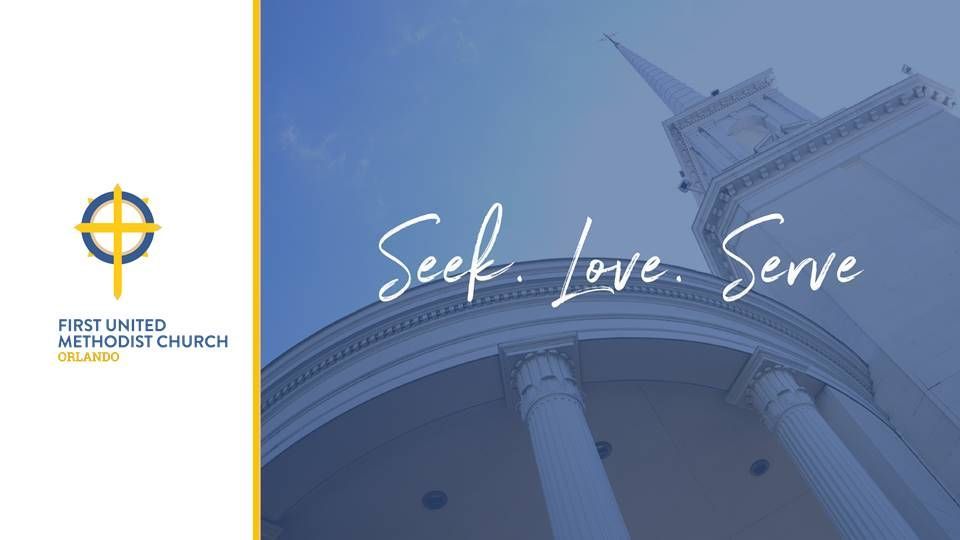Created in the Image and Likeness of God
A blog post from Pastor Vance

In a recent sermon, I shared that one of my primary, core theological/biblical convictions is that every person – without exception - is made in the image and likeness of God, endowed with inherent dignity and sacred worth. No matter who you are, or what you have done, or what has been done to you, nothing can erase your divine nature.
Following that sermon, a First Church member commented that this I share this belief often, and she asked me to elaborate on what I mean when I say we are, “…made in the image and likeness of God.”
I didn’t invent the phrase, of course. According to Genesis 1:26-27, “God said, ‘Let us make humans in our image, according to our likeness, and let them have dominion over the fish of the sea and over the birds of the air and over the cattle and over all the wild animals of the earth and over every creeping thing that creeps upon the earth.’ So God created humans in his image, in the image of God he created them; male and female he created them.”
We often think of “image and likeness” in physical terms. For instance, my wife is a mirror-image identical twin, who undeniably shares her twin sisters’ “image and likeness.” My daughter looks a lot like her mother, and we often joke that she is the missing triplet to my wife and sister-in-law. But, that’s not what Genesis 1 is talking about.
Obviously, God does not have a physical, human form. Yes - Jesus, as God incarnate, was human. And, obviously, Scripture and Christian Tradition have often depicted a personified God with human qualities, physicality and such. We’ve all seen Michelangelo’s image of a white-bearded, old-man-in-the-sky God, and there are many others like it. But, the essence of God’s being and nature transcends personification or depiction. God is essentially Spirit. When we talk about the face of God, or the heart of God, or the hands of God, we are speaking figuratively, not literally. The phrase, “In the image of God he created them; male and female he created them,” obviously negates the possibility of physical likeness, as men and women are obviously different, yet both bear God’s image.
Rather, I believe, God created us, male and female, in the image and likeness of God’s divine nature and character.
If we only consider Genesis 1:26-27 for this discussion, we can conclude at least three things regarding our divine image and likeness.
First, God created us in the image of God. God is divine, and by extension, so are we. Genesis 2 – a different Creation story - says that our physical lives are animated by the breath of God – the Holy Spirit – dwelling in us.
This is echoed in 2 Corinthians 4:6-7, “God said that light should shine out of the darkness. He is the same one who shone in our hearts to give us the light of the knowledge of God’s glory in the face of Jesus Christ. But we have this treasure in clay pots so that the awesome power belongs to God and doesn’t come from us.”
2 Peter 1:3-4 adds, “By his divine power the Lord has given us everything we need for life and godliness through the knowledge of the one who called us by his own honor and glory. Through his honor and glory he has given us his precious and wonderful promises, that you may share the divine nature and escape from the world’s immorality that sinful craving produces.”
We contain the breath of God. We are clay pots, full of holy treasure. We share in the divine nature. Being made in the image and likeness of God means we are, in some way, divine!
Second, Genesis 1:26 says, “Let us make humans in our image.” A logical question might be, “Who is us?!?” Christians interpret “us” to be the Trinity – God the Father, God the Son, and God the Holy Spirit. But, that’s a Christianized reading of an Ancient Jewish text. The original author of Genesis would never have thought of God as Trinity. Yet, God does refer to God’s self as a plurality. There’s something here implying God is not singular. And, if we’re willing to think in Trinitarian terms, then we are created in the image and likeness of a relational God. In fact, many of the great theologians, teachers and mystics of Christianity have taught that God’s Trinitarian nature means God is essentially and inherently love, as each person of the Trinity lovingly supports and defers to the others, in such a deeply unified way as to be one God, yet distinctive as three persons. God the Trinity is the Lover, the Beloved, and the Love between them.
In other words, to be made in the image and likeness of a Trinitarian God means that we are made for mutuality, relationship and love! And - by extension - mutuality, relationship and love have everything to do with the relationships, ethics, compassion, justice, forgiveness, etc.
Third, Genesis 1 is the first of two stories about God creating the entire universe ex nihilo – from nothing. God imagined. God spoke. Creation happened. Stars and planets, earth and sky, sunsets and sunrises, hills and valleys, water and air, vegetation and animals, and finally humans – male and female; in the words of the old hymn, “All things bright and beautiful, all creatures great and small, all things wise and wonderful, the Lord God made them all.”
In other words, in the midst of the Creator creating, the Creator said (I’m paraphrasing), “Let’s create creatures to create! We’ll give them imaginations, and a broad array of creative talents. We’ll give them inventive gifts and abilities, with an impetus to innovate. We’ll make them intelligent, able to learn and grow in knowledge, wisdom and understanding. We’ll give them problem solving skills. We’ll make some of them dreamers, with big ideas, and some of them doers, with great technical skills. We’ll place them in charge of Creation, responsible for protecting it, nurturing it, occasionally taming it, and cultivating it to make it even more beautiful and fruitful. We’ll even give them the ability to make more of themselves.”
If my paraphrase of Genesis 1:26 sounds like a departure from the biblical text, I would simply ask, why is “Let us make humans in our image, according to our likeness” immediately followed by “let them have dominion over the fish of the sea and over the birds of the air and over the cattle and over all the wild animals of the earth and over every creeping thing that creeps upon the earth.” Dominion means to rule or govern, and we know benevolent rulers are invested in the good of their realm. There’s a direct, undeniable link between the creation of humans, made in God’s image, charged with the ongoing responsibility to nurture and care for what God has made and placed in our hands. Genesis 2:15 affirms this, “The Lord God took the human and settled him in the garden of Eden to farm it and to take care of it.”
In other words, to be created in the image and likeness of God the Creator means that we are also creators, and guardians of all God has made.
So, just from Genesis 1:26-27, we can infer that bearing the image and likeness of God doesn’t have anything to do with our physical bodies or appearance. Bearing the likeness and image of God means we are participants in God’s divine nature, we are created for mutuality and love, and we are created to be co-creators with God. These are God’s core, essential qualities, and our own.
Obviously, much more can be said about God’s character: God’s wisdom, God’s goodness, God’s kindness, God’s mercy, God’s strength, God’s power, God’s forgiveness, God’s faithfulness. Obviously, there’s much more we could say about God, as God is an inexhaustible topic, beyond our ability to ever fully comprehend or explain (meaning there’s also much we will never be capable of saying!). To say we are made in the image and likeness of God, both embraces the mystery and grandeur of all God is and humbly acknowledges that even the most saintly person is not, cannot be, and never will be God. We are made in the image of God, and bearers of the divine nature. But, as humans, we are not God. We are in God, and God is in us. But, we are not God. That’s humility: fully embracing my divinity, while never denying the limits and blessings of my humanity. I’m one with God, and yet I’m still made of dust.
Yet, as I was recently reminded, scientists have discovered that eve lowly dust comes from the ancient remains of stars dying long ao. Even our dust is stardust!
So, why is this one of my essential, core theological/biblical convictions? At least for the following reasons…
· It is a defining quality of God. Though we are human, and not angels or deities, God dignifies our humanity. God didn’t make us inferior. God didn’t make us broken. God didn’t make us weak, doomed to fail. God didn’t make robots – even highly skilled robots! Though we share much with the animal kingdom, we are more than animals. Psalm 8:3-6 says, “When I look at your heavens, the work of your fingers, the moon and the stars that you have established; what are humans that you are mindful of them, mortals that you care for them? Yet you have made them a little lower than God and crowned them with glory and honor. You have given them dominion over the works of your hands.” What kind of God creates humans just “a little lower than God”? A God whose nature is secure enough to share divinity, generously – that’s who!
· It is a defining quality for me. Though I sin, though I’m riddled with guilt for past sins, though I fall short of the glory of God daily, though I battle a vast array of self-doubts and insecurities, my essential nature is holiness. That is who I am, thanks be to God! I’m better than my worst days. I’m not defined by the worst I’ve done. And, gloriously, I can be more. As long as God’s divine nature is working within me, I can be and become more than I am! Thankfully, God’s not done with me yet (and never will be)!
· It is a defining quality of others. Though I may not like ever human I encounter, or condone their behavior, or agree with their opinions, or appreciate their aroma, or enjoy their humor, or clearly see any desirable quality, I cannot deny their sacred worth. Though a person may offend me, disappoint me, or even hurt me, I cannot deny the image of God within them. Even if I consider someone a hopeless immoral reprobate, a scourge on society, a bad apple with a rotten core, deserving of every conceivable misfortune and punishment, I cannot deny God’s love for them. Though it may seem impossible to clear away their offensiveness, or to forgive their failings, or to tolerate their quirks, or even endure being in their presence, if I begin with the conviction that they, too, are made in God’s image – as I am – I have to see them as more than their shortcomings. And, just as God loves, blesses, and forgives unconditionally, something in me is potentially capable of doing the same.
Ultimately, what we believe about God matters – a lot! Though my beliefs about God extend beyond our divine image and likeness, this seems like a pretty good place to start, and then build a broader theology from there!
I would love to hear your thoughts! Send me an email (vance@firstchurchorlando.org) or comment below.
Pastor Vance





